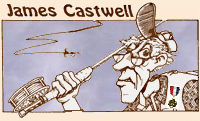|
One of the things I have noticed over my years of fly fishing
is that most of us can actually cast well enough to get the job
done no matter where we fish of what we fly fish for. One way
or another we get the fly out there. I still remember when I use
to have to avoid dinosaurs along stream side that my flycasting
was so bad that I don't think my cast ever stopped. Just front to
back, repeat, repeat, repeat. Hopefully a fish would break the
cycle. I was just a kid, how was I supposed to know that stopping
the rod, (yes, actually stopping the rod) makes the line go.
We see a lot of folks at the Fish-In's and on the stream working
way, way too hard though at casting. It is not supposed to be an
aerobic event, just a nice time on the water. I know, many will
say they do not work too hard at it at all. And I agree, you don't.
You have learned how to make the line do just what you want it
to, mostly without even thinking about it. You see a place where
you want your fly to go and you get it there. Probably with a darn
good presentation at that. But it was not always that way and still
is not for many. Those are the ones I am referring to here. The guys
who are getting the job done but are nearly out of breath doing so.
You know who you are. You have no time for practice casting
and for that mater, you have no particular idea of what to practice
anyway. Practicing what you already do does not seem like a giant
step forward either. What if you could learn of a few little things
you could try in the back yard, the park, or the street? What if a
couple of things you could try (yes, use your regular fly fishing line)
(just don't beat the crap out of it!) Might make your everyday fly
fishing easier? Even if you won't take out your gear, at least
compromise and consider doing them 'before' you tie on a fly
the next time you go out. No, not with a fly on. This is learning,
not fishing. The goal is to have your casting so smooth and
automatic - effortless that you don't even think about it while
you're fishing.
The biggie, the one thing I want you to do first, the key to the
whole idea is; put both feet together, side-by-side, pointed at
the target. This is to cancel out any old habits you may have
developed by this time. It often helps. Use less effort. That's
right. Don't work so hard at it. Think of just the tip of the rod
doing some work for you for a change instead of you doing it
all. Swinging the rod, no matter how hard you do it, is not
usually an efficient method of casting.
Listen to the sound of your fly rod. Listen closely on the front
stroke and on the back stroke. Do they sound about the same?
They should. One big problem that shows up is the big swoosh
heard on one direction or the other. (Hint; ‘swoosh' is to be
discouraged) The sound is from the rod traveling through the
air but not flexing. Most of the rod is simply directing the line,
not actually casting it. The rod must bend to become effective.
When you hear that sound you are working way too hard.
Stop the rod, watch what happens to the line, direct your
force to the top of the rod, not the whole rod. It is not a
carpet beater. Make it work so you don't have to. At least,
it's something to think about. ~ James Castwell
|



